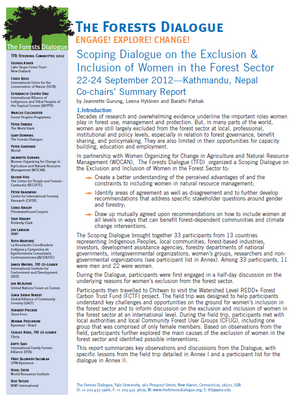Co-chairs’ Summary: Scoping Dialogue on the Exclusion and Inclusion of Women in the Forest Sector
Decades of research and overwhelming evidence underline the important roles women play in forest use, management and protection. But, in many parts of the world, women are still largely excluded from the forest sector at local, professional, institutional and policy levels, especially in relation to forest governance, benefit sharing, and policymaking. They are also limited in their opportunities for capacity building, education and employment.
In partnership with Women Organizing for Change in Agriculture and Natural Resource Management (WOCAN), The Forests Dialogue (TFD) organized a Scoping Dialogue on the Exclusion and Inclusion of Women in the Forest Sector to:
- Create a better understanding of the perceived advantages of and the constraints to including women in natural resource management;
- Identify areas of agreement as well as disagreement and to further develop recommendations that address specific stakeholder questions around gender and forestry;
- Draw up mutually agreed upon recommendations on how to include women at all levels in ways that can benefit forest-dependent communities and climate change interventions.
The Scoping Dialogue brought together 33 participants from 13 countries representing Indigenous Peoples, local communities, forest-based industries, investors, development assistance agencies, forestry departments of national governments, intergovernmental organizations, women’s groups, researchers and nongovernmental organizations (see participant list in Annex). Among 33 participants, 11 were men and 22 were women.
During the Dialogue, participants were first engaged in a half-day discussion on the underlying reasons for women’s exclusion from the forest sector.
Participants then traveled to Chitwan to visit the Watershed Level REDD+ Forest Carbon Trust Fund (FCTF) project. The field trip was designed to help participants understand key challenges and opportunities on the ground for women’s inclusion in the forest sector and to inform discussion on the exclusion and inclusion of women in the forest sector at an international level. During the field trip, participants met with local authorities and local Community Forest User Groups (CFUG), including one group that was comprised of only female members. Based on observations from the field, participants further explored the main causes of the exclusion of women in the forest sector and identified possible interventions.

